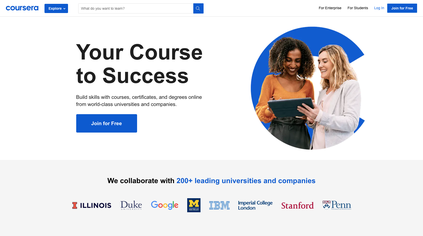
In today’s digital era, online learning platforms have transformed the way people acquire new skills and knowledge. Among these platforms, Coursera has emerged as a frontrunner, offering a diverse range of courses, professional certificates, and degree programs from world-class institutions. Whether you’re a student, a working professional, or someone looking to pivot into a new career, Coursera provides accessible, high-quality education that meets various learning needs. This blog explores Coursera’s history, offerings, benefits, and overall impact on the global education landscape.
The History of Coursera
Coursera was founded in 2012 by Andrew Ng and Daphne Koller, two Stanford University professors who envisioned a world where anyone, anywhere, could access top-tier education. Their mission was to provide affordable and flexible learning opportunities that could bridge the gap between traditional education and digital accessibility.
Over the years, Coursera has expanded rapidly, partnering with top universities and organizations such as Harvard, Yale, Google, IBM, and Microsoft. The platform has also evolved beyond individual courses to offer full degree programs, professional certificates, and corporate training solutions.
Coursera’s Course Offerings
Coursera offers a wide array of courses across different fields, including:
1. Academic Courses
Coursera collaborates with prestigious universities to provide free and paid courses in subjects like:
- Computer Science
- Business and Finance
- Data Science
- Arts and Humanities
- Health and Medicine
- Social Sciences
- Mathematics and Engineering
2. Professional Certificates
For those looking to boost their careers, Coursera provides specialized programs like:
- Google IT Support Professional Certificate
- IBM Data Science Certificate
- Meta (Facebook) Social Media Marketing Professional Certificate
- AWS Cloud Practitioner Certification
3. Full Degree Programs
Coursera also offers fully online bachelor’s and master’s degrees in partnership with universities. Some notable programs include:
- Master of Business Administration (MBA) – University of Illinois
- Master of Computer Science – Arizona State University
- Bachelor of Science in Computer Science – University of London
4. Guided Projects and Hands-on Learning
Learners can take short guided projects, which provide practical, hands-on experience in programming, data analysis, and other technical skills.
5. Specialized Courses for Businesses
Many organizations use Coursera for Business, which offers customized learning paths to upskill employees in digital transformation, AI, leadership, and industry-specific knowledge.

Benefits of Learning on Coursera
1. Access to High-Quality Education
One of Coursera’s biggest advantages is its collaboration with top-tier institutions and industry leaders, ensuring that learners receive education from renowned professors and experts.
2. Flexible Learning Schedule
Unlike traditional education, Coursera allows students to learn at their own pace. This flexibility is ideal for working professionals, parents, and students juggling multiple responsibilities.
3. Affordable Learning Options
Many courses on Coursera are free, with the option to pay for certificates or full programs. Compared to traditional university degrees, Coursera provides a cost-effective alternative.
4. Career Advancement Opportunities
With industry-recognized certifications and degrees, Coursera helps learners enhance their resumes and improve their job prospects. Companies such as Google, IBM, and Amazon recognize Coursera certificates in hiring processes.
5. Global Learning Community
Learners on Coursera come from diverse backgrounds and regions, allowing for rich discussions and networking opportunities.
6. Hands-on Learning and Skill Development
With the rise of AI, data science, and cloud computing, practical skills are essential. Coursera provides real-world projects and case studies that prepare learners for industry challenges.

Coursera Plus: An All-Access Subscription
Coursera offers a Coursera Plus subscription, which provides unlimited access to over 7,000 courses, guided projects, and professional certificates for a flat annual or monthly fee. This is ideal for avid learners who wish to take multiple courses without paying separately for each.
The Future of Coursera and Online Learning
As technology advances, Coursera continues to evolve by integrating AI-driven learning experiences, virtual reality courses, and personalized education pathways. With the increasing demand for remote education and skill-based learning, Coursera is well-positioned to shape the future of online education.

How to Get Started on Coursera
If you’re new to Coursera, here’s how you can begin your learning journey:
- Sign Up for a Free Account – Create an account on Coursera’s website or app.
- Browse Courses and Programs – Explore the vast catalog to find courses that match your interests or career goals.
- Enroll in a Course – Choose from free courses or opt for paid certificates for added credentials.
- Engage in Learning Activities – Watch video lectures, complete assignments, and participate in discussion forums.
- Earn a Certificate or Degree – Upon completion, receive a certificate or degree to showcase on your resume and LinkedIn profile.

Conclusion
Coursera has revolutionized online learning by making high-quality education accessible and affordable for millions of people worldwide. Whether you’re looking to gain new skills, earn a degree, or advance in your career, Coursera offers versatile learning solutions for every need. With its global reach, flexibility, and industry recognition, Coursera remains a leader in the digital education space.
If you haven’t explored Coursera yet, now is the perfect time to start! With thousands of courses at your fingertips, the opportunities for learning and growth are endless.